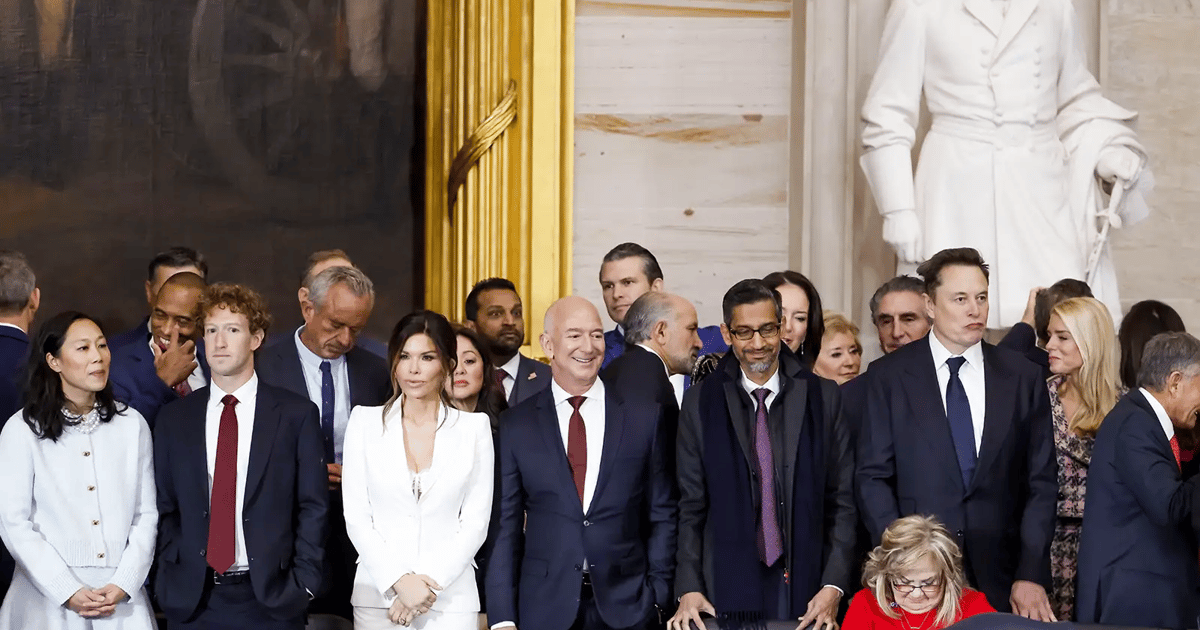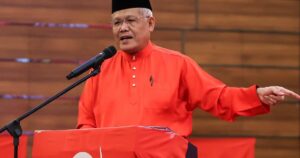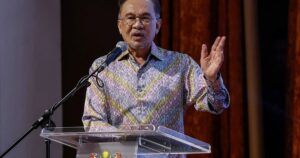
In a very recent US media interview, the CEO of McDonald’s said something shocking. In explaining the company’s declining sales, he said the top 10% of the population are still buying McDonald’s stuff, but the bottom 90% are buying less, with some even skipping meals.
This is not my own analysis or conjecture. This is straight from the mouth of the big boss of McDonald’s himself.
There are certainly other reasons – customer backlash against aggressive pricing strategies; food inflation brought about by trade wars; the many boycotts against McDonald’s across the world; as well as the generally cautious, if not downright gloomy, economic mood.
One thing is very clear, though: times are tough for those not at the top. Even so, in America, the rich have become richer and more powerful.
Consider this: at Donald Trump‘s inauguration last January, the handful of people standing behind him were collectively worth close to a trillion dollars, wealth that exceeds the GDP of most nations.
Most of the people there were at least billionaires. And yet these billionaires were the “poor” ones compared to the deci- or centi-billionaires such as Elon Musk, Jeff Bezos and Mark Zuckerberg.
In Forbes’ latest report of the richest 400 Americans, this super elite group of people went from a collective wealth of US$5.4 trillion to US$6.6 trillion in just a year, a growth of 22%, adding US$1.2 trillion of wealth in a year when many people were tightening their belts or even skipping meals.
Insane is the word that comes to mind. So does obscene. And immoral.
Toxic meritocracy
This reminds me of a story related by a Malaysian friend who resides in the US about his American friend who’s worth “only” US$500 million and who doesn’t feel very rich at all.
Nowadays, US$500 million doesn’t buy you a super-yacht or the latest private jet or a big-name sports team. Instead, you go to bed each night feeling sorry for yourself and praying for a few hundred more millions!
What a world we live in. Anyway, there’s a sickness here, and I’ll describe it in two words – toxic meritocracy.
It’s the disease of filthy rich people who think their wealth is proof that they’re superior to others, and hence are entitled to lord it over those poor and obviously incompetent, benighted and mediocre masses.
The logic is that if you’re poor, it’s your own fault for either not working hard enough or for making poor life choices. Therefore, you deserve whatever bad things befall you.
Empathy has become a bad thing, with even some preaching from the pulpits against it. Meanwhile, toxic meritocracy is dismantling the old social contract that the rich will do most of the societal heavy lifting by paying more income taxes to the national treasury.
When greed is ‘good’
Now the rich are saying that because they’ve “worked hard” to earn their wealth, they should get to keep as much of it as possible. This means cutting their income taxes while getting others to bear, however disproportionately, the cost of keeping society going, through tariffs and reduced social services.
In the old days of Ronald Reagan and Milton Friedman, the rich used to trot out the cliché about trickle-down economics, the notion that if the rich get richer, the extra wealth will flow down to the masses below, too. So the poor must sacrifice to let the rich become richer.
Nobody even pretends to say that any more. Instead, capitalism, or what’s being called late-stage capitalism, has gone rogue and become a hungry beast that devours those not rich enough to ride on its back.
Wealth for these owners of capital can easily be made by using technology to create monopolies and then hiking up prices and cutting down costs any which way possible, which often means cutting down the human workforce.
The world has always gone through economic cycles of booms and busts. Malaysians have seen many cycles themselves, whether with nice “Voluntary Separation Scheme” packages or outright retrenchments with bare legal minimum benefits, or even with nothing at all.
These sucked, but by themselves, they’re not necessarily wrong. Some of the retrenchments during the Asian financial crisis of 1997 literally saved many companies from going under.
But many other layoffs then, and especially since, weren’t so justified. They were mostly just to produce ever more profits and ever higher share prices that benefited only the few at the top.
Jobs are easier to cut
In an ever-more competitive world, growing revenue is becoming increasingly difficult. It involves more intense competition, taking bigger and riskier gambles and perhaps breaking some laws and regulations, all in an increasingly unpredictable global economy.
But cutting costs is easier, especially cutting labour costs, often because by then you’ve cut everything else, and also because now you’ve ready-made replacement technology.
What started as the mechanisation of mills and farms and transport evolved into automation when computers became more powerful. Robots can now do almost anything humans can, without needing rest breaks or taking sick leave.
This automation now means banks don’t need tellers; supermarkets have self-checkout counters; online businesses cut out many intermediaries and deal directly with customers. More and more human jobs are becoming redundant.
And now we have the mother of all technology: artificial intelligence. Though AI has been around for a while, it is only now that computing power and raw data is available in large enough quantities and low enough cost to bring AI into the mainstream.
We’re beginning to see its impact. Jobs are being eliminated, and not just low-level jobs. They include skilled white-collar jobs in law, medicine, computing and many other professions and trades. And the worst is yet to come.
There’s an interesting theory that the Trump administration is getting rid of immigrant workers in the US to create vacancies for low-paying jobs that’ll be needed when AI finally makes many low-skill Americans, such as many of his supporters, jobless.
Sounds Orwellian. But sounds pretty credible, too.
Ruthless oligarchs
Today, powerful business titans no longer brag about creating jobs, the way the Henry Fords of the last century did. They brag about being ruthless in “downsizing” or “rightsizing” to create “shareholders’ value”. They get incredibly rich by having the stock market go crazy about the future they promise.
And the promise is that the future will be driven by technology that’ll make things better and faster, and cheaper, mostly by eliminating the human factor in producing them.
What we’ve seen is that the power and wealth this technology creates is increasingly being held in the hands of an ever smaller group of super-rich people – the oligarchs.
What’s also not being said is what would happen to the masses of people when the new technologies take away their jobs.
Elon Musk, rather surprisingly, had suggested a universal basic income – the idea that society, through government and presumably through taxes, will pay its citizens a salary just for existing.
I don’t think the rest of his oligarch peers even care enough to spend any time thinking about this issue. But this issue is becoming more and more real by the day.
I know of many people around me – friends, ex-colleagues, even family and relatives – who either lost their jobs or are desperately looking for their first job. Some are at an age where finding a suitable job – or even any job – is becoming harder.
They’re ”overqualified”, which is often just a euphemism for “too old”. But even without this ageism working against you, jobs of any type are becoming increasingly harder to find.
Big investments, few jobs
Some of the huge investments pouring into Malaysia, such as for the data centres owned by the world’s biggest tech giants, don’t create many jobs. They’re super expensive to build and run, but employ only a small number of people.
The recent focus on learning how to code to secure good jobs in the future seems to have slowed down. This is not a skill that many can pick and excel in anyway, plus guess what? AI is also taking over many of these coding jobs!
Malaysia, perhaps being a few years behind the global economic curve, and blessed with a rather varied economy of manufacturing and services and natural resources and tourism, is more shielded from the storms buffeting the more mature economies.
But if this trend continues, we will also be sucked into this harsh and scary world where the rich get richer and the poor have fewer chances of breaking out of poverty and financial insecurity.
Technology, supposedly invented to make our lives easier, has become a tool to exercise huge power and control over society, while making its owners and inventors immensely rich.
I shudder to think about this scary future. I’m blessed to have a life that’s so much better than that of my parents. I was also lucky that I started from a very low starting point.
I don’t think the current generation, including my own children, can be as optimistic about their own future, and certainly the future of their own children, too.
The views expressed are those of the writer and do not necessarily reflect those of FMT.






